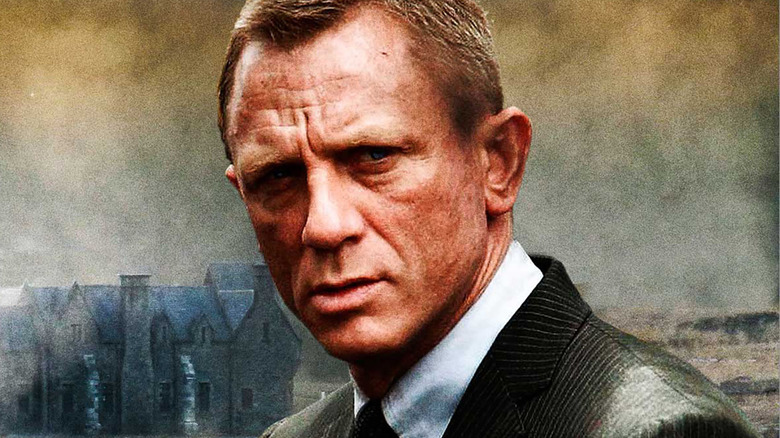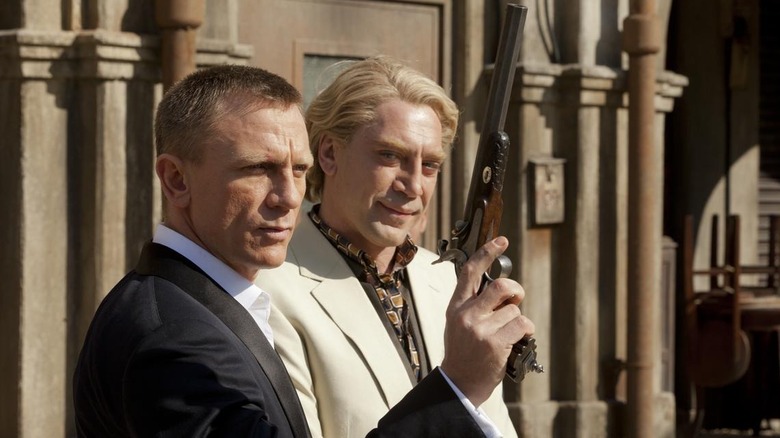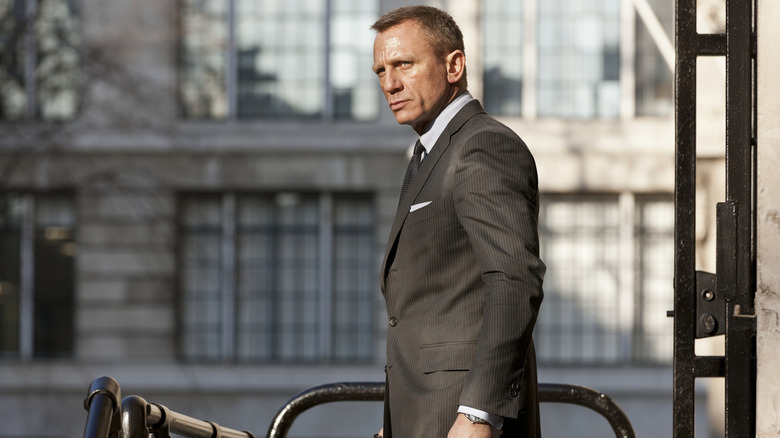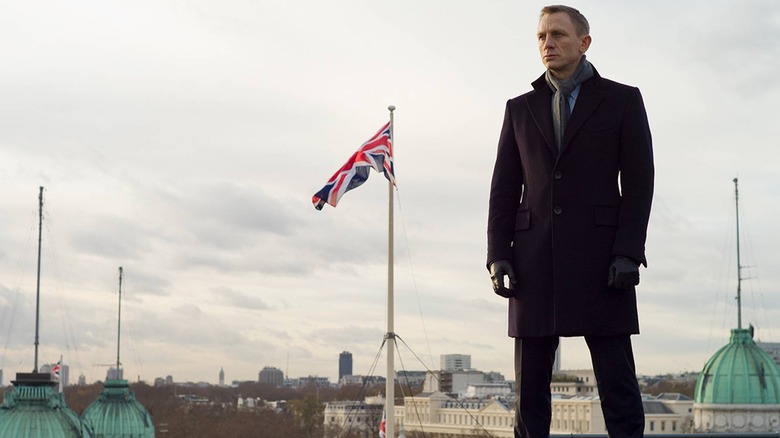
(Welcome to Tales from the Box Office, our column that examines box office miracles, disasters, and everything in between, as well as what we can learn from them.)
Daniel Craig's debut as 007 came in 2006's "Casino Royale." It simply cannot be overstated just how radical that movie was in comparison to how Pierce Brosnan ended his run with "Die Another Day" just four years earlier. Though Craig's casting was initially met with distaste from certain fans (as the first ever "blond Bond," he was a controversial pick), the actor quickly asserted himself as a force to be reckoned with and was welcome with open arms by moviegoers the world over for the rest of his tenure, which recently wrapped up with the release of "No Time to Die."
Given that Craig is saying goodbye to the role after his character-defining five-movie run, we are going to have a look at the biggest moment, not just during his time in the role, but for the "James Bond" franchise in general. Indeed, we are going to look back at "Skyfall" and how the film managed to defy the odds, embrace the moment, and become the biggest "Bond" movie of all time.
The Movie: Skyfall

"Casino Royale" truly kicked the door open to this bold new era of Bond in high fashion. Unfortunately, the writer's strike, among other things, put a bit of a wet blanket over the follow-up, 2008's "Quantum of Solace." While I personally have come to appreciate that movie quite a bit as a very direct sequel to Craig's first go-around, it's certainly not as much of a crowd-pleaser. To make matters more complicated, there was quite the delay between instalments, mostly due to MGM attempting to overcome bankruptcy, with a four-year gap ultimately coming between 007 and his return to the silver screen. But with director Sam Mendes ("American Beauty") at the helm, and a real motivation to get it right, "Skyfall" emerged -- hitting theaters in 2012 and going on to become the definition of a crowd-pleasing blockbuster, igniting the franchise in a way we hadn't seen in years, if ever.
For much of its existence, the Bond movies have chased trends, being just a few years behind the ball, generally speaking. "Moonraker" chased "Star Wars" in 1979, for example, with gloriously campy results. In the case of "Skyfall," the filmmakers decided to set aside, somewhat, the interconnected story of Craig's version of the character that had dominated the first two movies in favor of sending him on a seemingly by-the-books mission involving an important list of stolen field agent identities. The mission brings him face-to-face with a former MI6 agent, Silva, played by Javier Bardem. In this case, the series was chasing the dark and gritty revamp of a beloved icon that had been so brilliantly executed by Christopher Nolan in "The Dark Knight" in 2008. To that end, we see Bond shot off a train, falling hundreds of feet to what appears to be his death in the cold open before Adele's absolute banger "Skyfall" rings out over an outstanding credits sequence. Chef's kiss.
Not every franchise needs dark and gritty, but Mendes and Co. managed to make it work like gangbusters in this case. For as much as this is a "Bond on a mission" story, it takes so many unique turns. The lack of a true Bond girl, with Judi Dench's M, in some ways, filling in that role. The idea of visiting James' past, with the whole climax taking place at his childhood home, which is what the movie's title is in reference to. Not to mention the fact that it may be one of the best-looking movies in the series, if not one of the best-looking Blockbusters of the last decade overall, thanks in no small part to the brilliance of cinematographer Roger Deakins. It all added up to a special moment and proved to be a once-in-a-lifetime, lightning-in-a-bottle moment for a legacy franchise.
The Financial Journey

It's amazing how much of a movie's success can seemingly always be tied back to a good marketing campaign. It certainly helps if one has a good movie to market, as was the case with "Skyfall," but it is amazing how often successful movies, in hindsight, kicked things off with a kickass teaser trailer. Such is the case with "Skyfall." Though a bit dated, this teaser is intriguing as hell, setting the stage for the mass appeal this movie would ultimately prove to have.
"Skyfall" began its theatrical rollout on October 26, 2012, with a gangbusters $35 million opening weekend in the U.K., to go along with a solid debut in many other countries around the world. But when the film opened in the U.S. on November 9, it became clear just how big of a hit MGM and Sony had on their hands. Craig's third adventure as 007 opened to $88.3 million domestically, by far a record for the franchise that still stands to this day. Quite simply, "James Bond" has never been a cornerstone franchise in the U.S. While many of the movies have performed well, it's never been an "America first" sort of thing. But audiences turned up in droves to see this one.
In the end, "Skyfall" played for 108 days in theaters, taking in $304.3 million domestically. The next closest entry in the series is "Spectre," the eventual sequel to this movie, with $200 million. That illustrates just how far ahead of the pack "Skyfall" was. Especially when we consider that the closest "Bond" movie not headlined by Craig is "Die Another Day" ($160.9 million). This became a wild outlier in a franchise that had been going strong for 50 years. And, even more amazingly, "Skyfall" made just 27.5 percent of its huge haul in North America.
Internationally, the movie played like gangbusters, taking in $804.2 million. All told, the film earned a hugely impressive $1.108 billion. That, for a time, made it not only the highest-grossing "Bond" movie of all time, a record that still stands to this day, but Sony's highest-grossing release ever, which was only somewhat recently topped by "Spider-Man: Far From Home" ($1.13 billion).
The Lessons Contained Within

Hollywood is often exhaustingly about chasing trends. Unfortunately, much of the time, chasing these trends becomes tiresome, as studios often miss the point and churn out imitations that miss the point of what made the trendsetter special in the first place. "Skyfall," however, managed to chase the dark and gritty trend in stunningly entertaining fashion. This is how one takes a popular idea and applies it to another franchise with staggering effectiveness. Nearly a decade removed, this movie increasingly feels like a miracle in the blockbuster landscape.
Relating more specifically to the "James Bond" franchise, the only problem with "Skyfall" is that it set an almost impossible standard in a business that was becoming franchise obsessed in ways we had never seen before. That same year, "The Avengers" came out and forced every studio to contend with the notion of a cinematic universe and how to get in on that money train.
Both "Spectre" and "No Time to Die" would have the almost impossible task of trying to live up to "Skyfall," critically and commercially, while also returning to the notion of an interconnected storyline, firmly connecting Craig's films together. The lesson, though, is that "Bond" should not be expected to meet this insane level of success every time out of the gate. This happened once in 50 years, and it may never happen again. So, perhaps MGM shouldn't give these movies $250 million budgets assuming/hoping they will make $1 billion at the box office. Rather, try to make the best movie possible in that particular moment, with a relatively reasonable blockbuster budget, while hoping that the stars can once again align. Don't chase this dragon during the next actor's tenure. Madness that way lies.
Read this next: The 20 Greatest James Bond Villains Ever
The post Tales From the Box Office: How Skyfall Became the Biggest Bond Movie Ever appeared first on /Film.
0 Commentaires